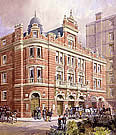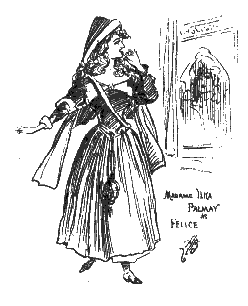 |
 |
 |
||||||
INTRODUCTION
With one foot in the world of comic opera and the other dipping its toes into the slapstick world of musical comedy, His Majesty was a transitional Savoy opera.

The two worlds of musical theatre this work exemplifies was embodied in its two principal performers. George Grossmith, the D'Oyly Carte principal comedian from the company's inception in 1877 until 1889, played the title role, but his scenes were stolen at every opportunity by Walter Passmore, a comedian of much "lower" taste who personified the course the London musical was taking. Passmore, more physical in his humor, would eventually replace Grossmith as the Savoy type of comedian, but for now (as in the second version of Mirette) he was given much freer reign.
It may seem somewhat strange to begin a discussion of a Savoy opera with its performers, but at this time in the history of the D'Oyly Carte Opera Company there was little else to offer. The story is familiar -- one might even say time-worn. Many Gilbertian devices are in evidence, including the lost baby and the delayed entrance of a major character until late in the second act.
The libretto by F.C. Burnand was another attempt by its author to cash in on the Savoy success. Unlike in The Chieftain, he seems to have realized his shortcomings and enlisted the aid of fellow Punch-staffer Rudolph Lehmann to write the lyrics. Besides editing Punch for thirty years (he retired in 1919), Lehmann's claim to fame is as a champion rower, described by the young Teddy Roosevelt as "about the greatest authority on rowing in the world." He was also the father of three extraordinarily artistic children: the author Rosamond, the poet John, and the actress Beatrix (who can be seen regularly on reruns of the Doctor Who episode "The Stones of Blood"). His Majesty seems to be R.C. Lehmann's only work for the stage.
Even Lehmann's work was less than satisfactory, for that old hand at breathing life into dying productions, Adrian Ross, was called in to fashion some of the lyrics.

Of all the British composers of the late Victorian era, few were better equipped to His Majesty's musical felicities justice than Sir Alexander Mackenzie. He was a composer and conductor of Scottish extraction, and had written the scores for two previous operas, The Troubadour (1886) and Colomba (1883). Grove's Dictionary notes that his "reputation as one of England's leading composers was established with the oratorio The Rose of Sharon (1884), perhaps his best large-scale composition." If the libretto for His Majesty was considered a failure, by all accounts Mackenzie's music was superb. This was his only foray into the world of comic opera.
His Majesty's shaky opening night led to revisions. Unfortunately, they went all for naught and the opera took its place among D'Oyly Carte's forgotten failures. The opera toured throughout 1897 alongside more familiar Gilbert and Sullivan works.
Grossmith was visibly nervous on opening night and only lasted four performances before pleading ill-health and returning to retirement. Henry Lytton, who had taken Grossmith's part in Ruddygore (1887) a few days into that opera's run, again filled in and played King Ferdinand until the opera closed.
Ilka Palmay, whose presence had done much in shaping Gilbert's libretto for The Grand Duke, played Felice. His Majesty gave her many opportunities to display her considerable talents as ballad singer, opera soprano, and comedienne, including the chance to sing in German, her native tongue. The song, "Dass Kleine Fraulein Muffchen," is a German version of Little Miss Muffet. Pitting the weak-voiced Grossmith against the histrionic Palmay probably did much to speed his departure.
Florence Perry, who had been something of an understudy or secondary soprano at the Savoy, played Chloris. More of a singer than an actress, she apparently rose to the challenge of being constantly upstaged by Palmay.
Page modified 26 July 2019